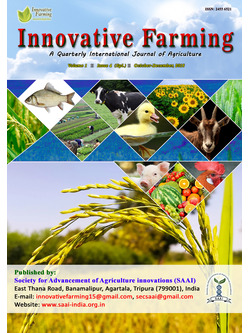
Andrographis Paniculata Nees - A Traditional High Value Medicinal Plant
Arbind Kumar Sai
Krishi Vigyan Kendra, Dantewada, Chhattisgarh - 494441, India
Lokesh Kumar Tinde*
Dept. of Agricultural Extension, BCKV, Nadia, Mohanpur (W.B.) - 741235, India
Subhendu Roy
Krishi Vigyan Kendra, Dantewada, Chhattisgarh - 494441, India
DOI: NIL
Keywords: Andrographis paniculata, Traditional uses, Pharmacology
Abstract
Andrographis paniculata Nees (Acanthaceae), also known as ‘Bhuin Neem’, is one among the prioritized medicinal plants traditionally used in treatment of dengue fever, chronic constipation, liver disease, indigestion, abdominal gas and low appetite, diarrhea, diabetes, arthritis, cancer, allergies, skin disease as well as against snake bite and agricultural uses etc. The plant is widely used in Ayurvedic and homeopathic systems of medicines. Because of its overexploitation in forest regions for medicinal use, it has become an endangered plant. Recently its population is very scanty in nature, so its ex-situ and in-situ conservation is necessary.
Downloads
not found
Reference
Hossain, M.S., Urbi, Z., Sule, A., & Rahman, K.M.H. (2014). Andrographis paniculata (Burn. F.) Wall. ex NEES: A review of ethnobotany, phytochemistry. The Scientific World Journal, p. 28.
Kumar, A., Dora, J., Singh, A., & Tripathi, R. (2012). A review on king of bitter (Kalmegh). International Journal of Research in Pharmacy and Chemistry, 2(1), 2231–2781.
Patidar, S., Gontia, A.S., Upadhyay, A., & Nayak, P.S. (2011). Biochemical constituents in Kalmegh (Andrographis paniculata Nees.) under various row spacing’s and nitrogen levels. World Applied Sciences Journal, 15(8), 1095–1099.
Sheokand, A., Sharma, A., & Gothecha, V.K. (2012). Vatsanabha (Aconitum ferox): From Visha to Amrita. International Journal of Ayurvedic and Herbal Medicine, 2(3), 423–426.
